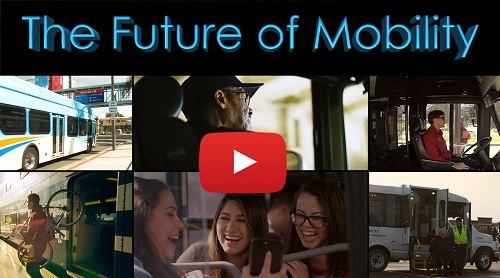Integrated Mobility Innovation
What's New
- FTA supports U.S. DOT’s Smart Cities initiative through the Accelerating Innovative Mobility (AIM), Enhancing Mobility Innovation (EMI), Integrated Mobility Innovation (IMI), and Mobility on Demand (MOD) Sandbox programs and partnership with the Shared-Use Mobility Center. Smart, connected communities improve quality of life through innovative technologies, fostering partnerships, and leveraging data to enhance equitable, accessible mobility for all.
- On March 16, 2020, FTA announced selections for $20.3 million in FY 2019 IMI projects. The demonstration projects focus on Mobility on Demand, Transit Automation, and Mobility Payment Integration.
Overview
Today, a diverse mobility ecosystem provides unprecedented flexibility and choices, including public transit, bikeshare, ride-hailing, electric scooters, and micro-transit. Public transportation agencies are taking on new roles as mobility managers, seeking to manage the evolving transportation ecosystem to meet their communities’ needs while they simultaneously transform themselves to offer better, more integrated service.
The IMI demonstration program supports the transit industry’s ability to leverage and integrate mobility innovations with existing services, while examining the impact of innovations on agency operations and the traveler experience.
IMI unifies three research focus areas: Mobility on Demand, Transit Automation, and Mobility Payment Integration. These areas examine how new service models, technologies, and other solutions can be brought together to support Complete Trips for All.
The goals of IMI are to:
- Explore new business approaches and technology solutions that support mobility
- Enable communities to adopt innovative mobility solutions that enhance transportation efficiency and effectiveness
- Facilitate the widespread deployment of proven mobility solutions that expand personal mobility
The primary objectives of IMI are to:
- Enhance transit industry preparedness for IMI
- Assist the transit industry to develop the ability to integrate IMI practices with existing public transit service
- Validate the technical and institutional feasibility of IMI business models, and document IMI best practices that may emerge from the demonstrations
- Measure the impacts of IMI on travelers and transportation systems
- Examine relevant public sector and Federal requirements, regulations, and policies that may support or hamper the public transit sector’s adoption of IMI
The Complete Trip Vision
IMI leverages FTA’s leadership of the Accessible Transportation Technologies Research Initiative (ATTRI) to ensure that all activities conducted as part of the IMI program advance the vision of a Complete Trip for All. The Complete Trip concept reflects the understanding that a person’s travel consists of a chain of steps beginning with an often-spontaneous decision to make a trip, through to planning an itinerary, traversing the built environment and its transportation networks (with or without a vehicle); navigating streets, intersections, facilities, stations, and stops to their destination – safely, efficiently, and carefree.
The Complete Trip is the realization that if any part of the trip-making chain is broken, the trip cannot be completed, and an opportunity is lost.
Eligible Activities
Eligible activities include all activities leading to the demonstration, such as planning and developing business models, obtaining equipment and service, acquiring or developing software and hardware interfaces to implement the project, operating the demonstration, and providing data to support performance measurement and evaluation.
Eligible Recipients
Eligible applicants under this notice are providers of public transportation, including public transportation agencies, state/local government DOTs, and federally recognized Indian tribes.
Statutory References
Public transportation innovation (49 U.S.C. § 5312)
Allocation of Funding
The IMI projects are funded under FTA’s Research, Development, Demonstration, and Deployment program authority.
Selected Projects
FTA selected 25 projects in 23 states to receive a share of approximately $20 million in funding through the IMI initiative to support mobility and innovation in the transit industry. View the project selections.
Technical Assistance
The Transportation Technical Assistance Coordination Library (TACL) provides a sustainable methodology and platform to access resources across a diverse range of transportation technical assistance centers and FTA. Participating FTA-funded technical assistance centers include:
- National Aging and Disability Transportation Center (NADTC)
- National Center for Applied Transit Technology (N-CATT)
- National Center for Mobility Management (NCMM)
- National Rural Transit Assistance Program (National RTAP)
- Shared-Use Mobility Center (SUMC)

